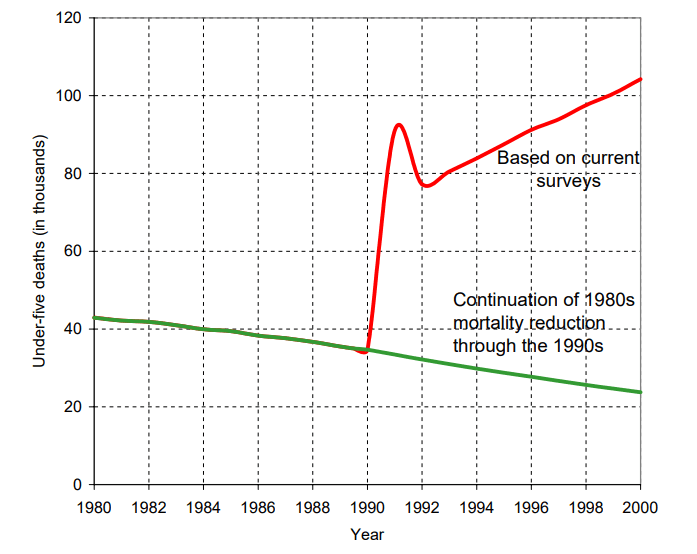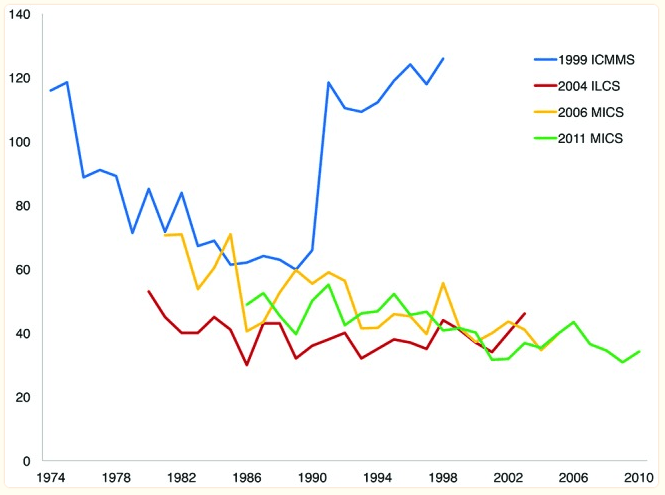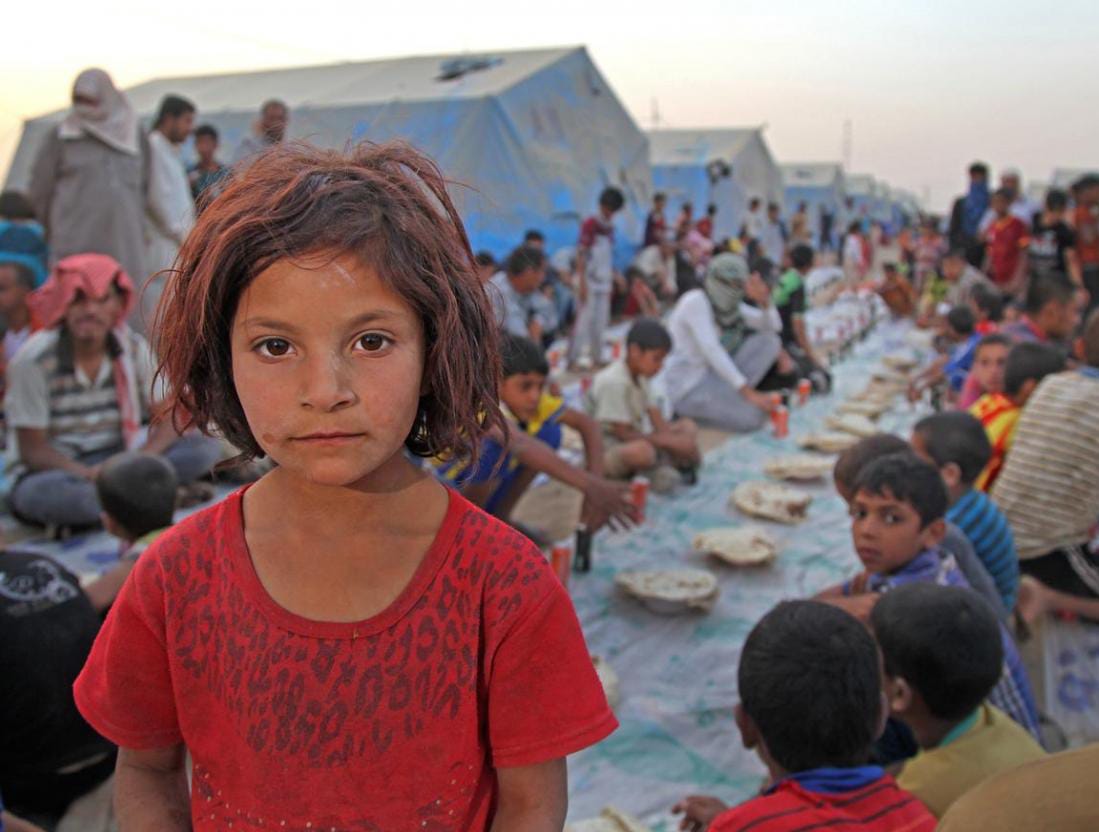There is a version that UN anti-Iraq sanctions imposed in 1990 due to Iraq's invasion of Kuwait led to the death of half a million Iraqi children. We have checked whether these statistics are correct.
Information about “half a million dead Iraqi children” is often associated with the name of former US Secretary of State Madeleine Albright, who advocated the introduction and tightening of sanctions. Following her death on March 23, 2022, many media outlets recalled how Albright responded to statistics about half a million child deaths answered: “We think it was worth it” (“Russia 1» «Moskovsky Komsomolets", RIA Novosti, "TASS", Regnum, Forbes.ru, "Gazeta.ru"). The same figure was mentioned by Margarita Simonyan on the TV channel NTV. The claim that half a million Iraqi children have died from US sanctions can often be seen in user posts "VKontakte", Facebook, Telegram, Twitter And LiveJournal.
Madeleine Albright served as US Secretary of State from 1997 to 2001. While still the US permanent representative to the UN, Albright zealously supported sanctions against Iraq. In a 1996 interview with 60 Minutes, host Lesley Stahl asked Albright question on the consequences of anti-Iraq sanctions:
Stahl: “We heard that half a million children died. I mean, that's more children than died in Hiroshima. And do you think it’s worth it?”
Albright: “I think this is a very difficult choice. But we think it's justified."
Then, however, Albright expressed I regret my words, but the quote is ingrained in the memory of people all over the world. Despite the wide response, few doubted the correctness of the presenter’s question: did sanctions against Iraq really lead to the death of half a million children?
Sanctions against Iraq were introduced by the UN Security Council on August 6, 1990, four days after invasion Iraq to Kuwait. The UN sanctions regime prohibited any form of trade and economic relations with Iraq. The supply of medicines and food was allowed, but was subject to careful regulation. One of the most intractable problems was the ban on the import of chlorine into Iraq, since chlorine could be used to create a military poison gas mustard gas. Lack of chlorine brought to a sharp reduction in the population's access to drinking water and chronic outbreaks of dysentery among children under five years of age. Lack of medicines, antiseptics and vaccines in kindergartens too led to outbreaks of many diseases such as measles, chicken pox and mumps.
The topic of the impact of sanctions on the infant mortality rate subsequently became the subject of speculation. In December 1995, a little more than five years after the introduction of sanctions, the authoritative medical journal Lancet published the results research Food and Agriculture Organization (FAO, a UN organization that fights hunger). According to the study's authors, about 576,000 Iraqi children have died due to UN economic sanctions against Iraq. The authors arrived at this figure as follows: Dr. Mary Smith Fawzi examined 2,120 children under 10 years of age in 25 districts of Baghdad. According to her observations, the mortality rate of infants has doubled, and the mortality rate of children under five years of age has increased five times compared to data collected Fawzi herself in 1991. Using this formula, the scientists calculated that this mortality rate would result in approximately 567,000 child deaths for the 3.6 million children living in Iraq. Many scientific publications quoted findings of the FAO report, and opponents of sanctions began operate this figure in order to convince the world community to soften the sanctions regime.

But the most frequently cited study was conducted four years later by the United Nations Children's Fund (UNICEF). In 1999, UNICEF published similar data: more than 500,000 children allegedly died due to UN sanctions against Iraq. This conclusion was made based on a comparison of child mortality trends in the 1980s and 1990s. The report argued that if the downward trend in child mortality rates in the 1980s had continued through the 1990s, there could hypothetically be half a million fewer child deaths in the country.
However, in 2017, researchers from the London School of Economics characterized UNICEF study as “falsification” and “particularly elaborate fraud.” In their opinion, there were serious shortcomings in the UNICEF report. For example, the high infant mortality rate in the early years of sanctions was partly due to the Iraqi government's crackdown on the Kurds in northern Iraq from 1988 to 1992. In addition, UNICEF's findings were based on data provided by the Iraqi government, and the accuracy of this data has never been independently verified. Authors of the 2017 report brought data from three other independent UN studies, which did not reveal a significant difference in child mortality rates before and after the imposition of sanctions. In response to criticism, UNICEF stated in press release, that their 1999 study "did not seek to obtain absolute numbers of how many children died in Iraq as a result of sanctions." Instead, they wanted to show that "if the significant reduction in child mortality in Iraq in the 1980s had continued through the 1990s—in other words, if there had not been two wars, if sanctions had not been imposed, and if investment in social services had continued—perhaps there would have been 500,000 fewer child deaths."

Another study by Columbia University professor Richard Garfield recorded approximately "106,000 excess deaths among children under five years of age from August 1990 to March 1998." Of those deaths, he estimates that a quarter were related to the aftermath of the Gulf War.
Thus, as later independent research has shown, UNICEF's estimate of half a million Iraqi children dead is inaccurate. The infant mortality statistics used in the UNICEF report were greatly inflated by the Iraqi government to discredit sanctions supporters and soften the sanctions regime. And the slight increase in child deaths in the 1990s was partly due to the Gulf War, the repression of the Kurdish population in the north of the country and the humanitarian crisis caused by the dictatorship of Saddam Hussein itself. To a similar conclusion came our colleagues from the Arab fact-checking agency Misbar, which investigates issues related to the countries of the Middle East and North Africa.
Cover image: UNICEF
Not true
Read on the topic:
- The Washington Post. Saddam Hussein said sanctions killed 500,000 children. That was ‘a spectacular lie.’
- Misbar. US Sanctions Did Not Kill 500,000 Iraqi Children
If you find a spelling or grammatical error, please let us know by highlighting the error text and clicking Ctrl+Enter.






